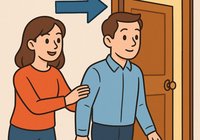| Phrasal verb | Main meaning |
|---|---|
take off [teɪk ɒf] | to leave the ground and begin to fly |
Other meanings
- to become successful quickly
- to remove something (especially clothes)
- to leave a place suddenly
- to take a break from work
Example Sentences Using the Phrasal Verb "take off"
- The plane took off at exactly 8 a.m.
- Sales really took off after the TV ad.
- He took off his jacket and sat down.
- She took off without saying goodbye.
- I’m going to take off next Friday to rest.
Other phrasal verbs with the verb take
take away
remove something from a place or person
take up
to begin a new activity or hobby
take out
to remove something from a place
take over
to gain control of something, especially a business or responsibility
take in
to absorb or understand something
take back
to return something
take after
to resemble a family member in appearance or character
take along
to bring someone or something with you
take down
to remove something from a higher position
take aside
to move someone away from others for a private conversation
take apart
disassemble into pieces
take through
to guide someone through a process or explain something step by step
take on
to accept or undertake a task or responsibility
take to
to begin to like someone or something
take over from
to assume control or responsibility from someone else
take out on
to direct your anger or frustration toward someone or something unfairly
take down a notch
to humble someone or reduce their arrogance
🔗 Learn more about the irregular verb take, including its forms and usage.


















